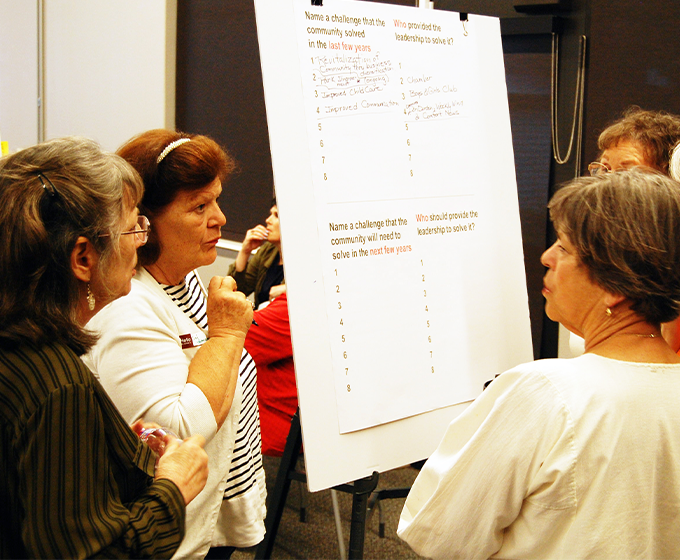
Comfort residents discuss the future of their community in a public forum.
OCTOBER 14, 2020 — UTSA’s Center for Urban and Regional Planning Research has been recognized for helping a small Texas community make big plans for its future. The Texas Chapter of the American Planning Association last week presented the plan—titled “Comfort Vision 2050”—with the Grassroots Initiative Award, one of just 15 Planning Achievement Awards for the year 2020.
Led by Ian Caine, an associate professor of architecture and the director of the center, the UTSA team of faculty and students worked with local organizers to develop the grassroots plan. The center is housed within UTSA’s College of Architecture, Construction and Planning.
The Grassroots Initiative Award specifically honors an effort “that illustrates how a neighborhood, community group or other local nongovernmental entity utilized the planning process to address a specific need or issue within the community.”
“Comfort Vision 2050” was supported by the Comfort Area Foundation and National Association for Latino Community Asset Builders, leveraging a grant from the U.S. Department of Housing and Urban Development.
“Comfort Vision 2050” offers the Hill Country community of Comfort a bottom-up, grassroots approach to urban planning that acknowledges the residents’ recent decision to resist incorporation. In 2015 a majority of Comfort residents (71%) voted against a proposition to incorporate their community, affirming a deeply held set of shared values that would come to provide a foundation for “Comfort Vision 2050.”
Since Comfort has no city officials or professional planners to carry out a traditional master plan, “Comfort Vision 2050” instead outlines 75 strategic initiatives that residents, business leaders, nonprofits and county officials can pursue immediately and independently, without help from city government.
“We hope this novel approach will prove useful throughout the Texas Hill Country, where 90% of the communities remain unincorporated,” Caine explained.
To create the vision plan, the UTSA team worked closely with various members of the Comfort community, including residents, the county commissioner and editors for the local newspaper.
“A spirit of collaboration drove this project, from the interactions among local residents to the cooperation between UTSA faculty and students,” Caine emphasized.
The UTSA team included William Dupont, professor of architecture; Corey Sparks, associate professor of demography; researcher Bill Barker; and Matthew Jackson and Thomas Tunstall of UTSA’s Institute for Economic Development. Additionally, student researchers Elizabeth Striedel, Ivan Ventura and Diego Sanchez made critical contributions to the drawings and field documentation.
“The success of this vision plan,” Caine added, “confirms the potential for applied, transdisciplinary research to simultaneously serve local communities, create new knowledge and advance best practices in our discipline.”
UTSA Today is produced by University Communications and Marketing, the official news source of The University of Texas at San Antonio. Send your feedback to news@utsa.edu. Keep up-to-date on UTSA news by visiting UTSA Today. Connect with UTSA online at Facebook, Twitter, Youtube and Instagram.
Move In To COLFA is strongly recommended for new students in COLFA. It gives you the chance to learn about the Student Success Center, campus resources and meet new friends!
Academic Classroom: Lecture Hall (MH 2.01.10,) McKinney Humanities BldgWe invite you to join us for Birds Up! Downtown, an exciting welcome back event designed to connect students with the different departments at the Downtown Campus. Students will have the opportunity to learn about some of the departments on campus, gain access to different resources, and collect some giveaways!
Bill Miller PlazaCome and celebrate this year's homecoming at the Downtown Campus with food, games, giveaways, music, and more. We look forward to seeing your Roadrunner Spirit!
Bill Miller PlazaThe University of Texas at San Antonio is dedicated to the advancement of knowledge through research and discovery, teaching and learning, community engagement and public service. As an institution of access and excellence, UTSA embraces multicultural traditions and serves as a center for intellectual and creative resources as well as a catalyst for socioeconomic development and the commercialization of intellectual property - for Texas, the nation and the world.
To be a premier public research university, providing access to educational excellence and preparing citizen leaders for the global environment.
We encourage an environment of dialogue and discovery, where integrity, excellence, respect, collaboration and innovation are fostered.